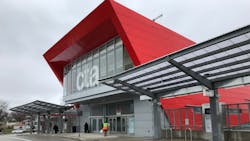Proposed 2021 CTA budget relies on new federal funding to support service
The proposed $1.64-billion operating budget for the Chicago Transit Authority (CTA) highlights the need for new federal funding to support public transportation across the United States.
Though CTA will enter 2021 with no planned changes to service or fares, the agency depends on continued support at the federal level to achieve that goal.
For 2021, the CTA is facing an operating budget deficit of approximately $375 million—a shortfall caused solely by the impacts of the COVID-19 pandemic. Since the start of the pandemic in March, the CTA—like transit agencies across the country—has seen an unprecedented loss of ridership and revenue. Further, state sales tax funding that supports transit is well below anticipated levels. The American Public Transportation Association (APTA) projects that if Congress or the administration do not provide additional emergency federal transit funding, six in 10 public transit agencies will have to consider service cuts or other cost-cutting measures.
“Over the last seven months, the CTA has provided an essential service to those who needed it the most: health care workers, emergency responders, grocery and manufacturing workers and those needing to make essential trips,” said CTA President Dorval R. Carter, Jr. “But in order to ensure we can continue to provide this critical service, we absolutely must receive additional funding from Congress.”
Congress has already supported public transit with a funding package earlier this year—funding that helped transit agencies across the country, including the CTA, to maintain service through 2020 and into early 2021. But further federal funding is needed to help transit agencies make up for continuing, unprecedented financial losses and lower-than-normal ridership.
Despite the challenges to the operating budget, which covers day-to-day service, the CTA continues to pursue much-needed capital investment. The proposed budget also includes a five-year Capital Improvement Program (CIP) of $3.4 billion, which is necessary to continue investing in modernization and capital improvement projects that will provide safer, more reliable service for customers, as well as an improved transit experience through the continued expansion of public art, removal of slow zones and upgrades to popular transit tools such as Ventra.
“Investment in transit infrastructure has always been an investment in a strong future for the city,” Carter said. “Further, continued investment in transit is directly tied to our city’s economic recovery, a way to promote jobs and opportunities at a time when the city needs them most.”
The CIP is supported by funding from Rebuild Illinois, the 2019 state capital program that was the first in more than a decade. More than half of the capital funding will go toward previously announced major projects, including:
- Upgrade of the Cottage Grove Green Line station ($60M);
- Blue Line O’Hare Branch power improvements ($50M) ;
- Advancement of the Red Line Extension project ($327.8M) ; and
- Phase 1 station improvements under the All Stations Accessibility Plan (ASAP) ($78M).
APTA estimates that with each dollar invested in transit it in turn creates $4 of economic activity.
“The devastating effects of the dual health and economic crisis only further highlight how much CTA’s long-term capital projects are urgently needed, and the importance of continuing to plan and identify funding for initiatives like ASAP and the Red Line Extension project,” Carter added.
Other capital projects to continue or begin in 2021 include:
- Testing of the 10 new 7000-Series rail cars;
- Quarter-life overhaul work on 5000-Series rail cars;
- Roll-out of newest all-electric buses; and
- Start of station and track structure construction as part of RPM Phase One.
A virtual public hearing will be held on November 12, 2020, at 6 p.m. Because of the pandemic and the Governor’s Executive Order prohibiting large public gatherings, the public hearing will proceed only virtually.
